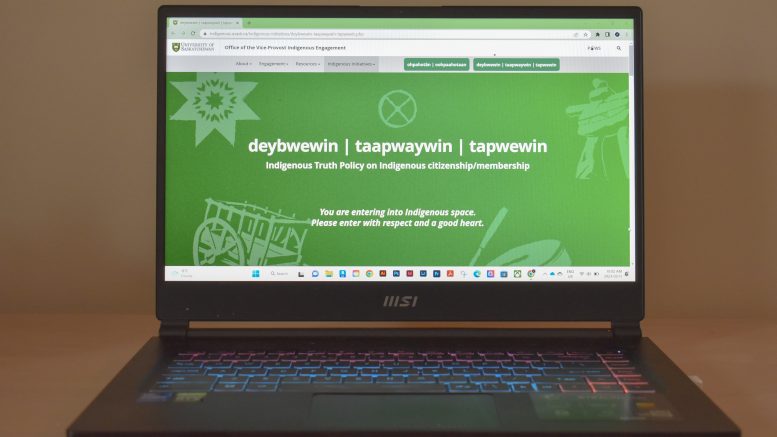The University of Saskatchewan (USask) has created an online portal where students, staff, faculty members and anyone in the university community who has self-identified as Indigenous must provide proof of Indigenous identity.
The website homepage states that the intent of this process is to “protect Indigenous truth and space for everyone.”
The new policy regarding Indigenous identity verification was established after a CBC investigation found that former USask professor Carrie Bourassa falsely claimed that she had Indigenous heritage.
USask has since stated that the honour system of Indigenous self-identification that it previously used would no longer be sufficient.
The new system will be used when someone applies for a job or scholarship that is specifically meant for an Indigenous person, as well as to verify the identities of those in existing Indigenous-specific positions or who have received any material benefit with Indigenous identity as a requirement.
USask stated that between 100 to 150 students and staff will need to be reviewed through the new identification system.
The portal, called “deybwewin, taapwaywin, tapwewin: Indigenous Truth,” is operated by the university, but it is Indigenous governments that have the right to determine what qualifies as proof of Indigenous membership or citizenship. Proof can range from status cards to oral history, depending on the requirements of the Indigenous community.
One of the resources available on the USask web portal is Métis lawyer Jean Teillet’s Indigenous Identity Fraud report.
The report goes into detail on what Teillet considers Indigenous identity fraud and the negative outcomes caused by falsifying Indigenous identity. Teillet’s definition of Indigenous identity fraud at the University includes any person “who intentionally and falsely identifies as Indigenous to obtain a faculty or staff position, funding or a student placement.”
The issue of determining Indigenous ancestry has created problems for faculty at Canadian universities. Réal Carrière, a Saskatchewan-born Cree-Métis assistant professor in political studies at the U of M, was denied a job at USask last year because the university determined that he lacked sufficient proof of Indigenous identity. The decision was criticized by USask faculty members in the department of Indigenous studies.
When asked for his thoughts on the new online portal, Carrière said that while he does think Indigenous identity fraud is a concern that needs to be addressed, he prefers an “innocent until proven guilty” approach to the issue.
“I don’t like the assumption of fraud,” Carrière said.
He added, “I think it’s an extra layer of policing to have to go through this.”
Carrière said that he prefers self-identification, but that he believes self-identifying as Indigenous through a binary ‘yes’ or ‘no’ system is insufficient.
“I think…the issue is that [with] self-identification, there needs to be a bit more of a response,” he said.
According to the “deybwewin, taapwaywin, tapwewin: Indigenous Truth” website, the university’s standing committee will provide guidance regarding the use of the new policy in an “appropriate, informed and Indigenous-led manner,” and will “contribute to securing and ensuring that space intended for Indigenous people is protected and secured for Indigenous people.”
The standing committee includes two faculty and two staff members, three Elders/Knowledge Keepers and four individuals from the office of the vice-provost, Indigenous engagement. For the university, the process of verifying the Indigenous identity of its community members is an ongoing matter.



